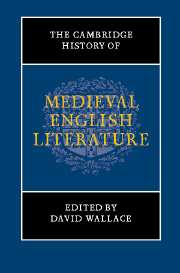Book contents
- Frontmatter
- I AFTER THE NORMAN CONQUEST
- II WRITING IN THE BRITISH ISLES
- III INSTITUTIONAL PRODUCTION
- IV AFTER THE BLACK DEATH
- Introduction
- 18 Alliterative poetry
- 19 Piers Plowman
- 20 The Middle English Mystics
- 21 Geoffrey Chaucer
- 22 John Gower
- 23 Middle English lives
- V BEFORE THE REFORMATION
- Chronological outline of historical events and texts in Britain, 1050–1550
- Bibliography
- Index of manuscripts
- Index
- References
18 - Alliterative poetry
from IV - AFTER THE BLACK DEATH
Published online by Cambridge University Press: 28 March 2008
- Frontmatter
- I AFTER THE NORMAN CONQUEST
- II WRITING IN THE BRITISH ISLES
- III INSTITUTIONAL PRODUCTION
- IV AFTER THE BLACK DEATH
- Introduction
- 18 Alliterative poetry
- 19 Piers Plowman
- 20 The Middle English Mystics
- 21 Geoffrey Chaucer
- 22 John Gower
- 23 Middle English lives
- V BEFORE THE REFORMATION
- Chronological outline of historical events and texts in Britain, 1050–1550
- Bibliography
- Index of manuscripts
- Index
- References
Summary
The title of this chapter, ‘Alliterative Poetry’, deliberately evades an ‘Old Historicist’ literary formulation – indeed, perhaps the most significant ‘Old Historicist’ failure in Middle English studies. By long-standing custom, this chapter should be entitled ‘The Alliterative Revival’. Such a sobriquet presupposes that scholars know clearly what alliteration is and how it is used in Middle English literary culture, that such alliterative usage at some point had died and at some later point experienced a quasi-divine resuscitation, and that this return to life comprised a single ‘revival’. All these propositions strike me as dubious, as is a further claim, always implicit in traditional discussions of ‘The Revival’, that this was a regional poetry of the north and west.
Such formulations depend upon a classic example of abstract principle driving the construction of historical evidence – and thus, of what constitutes a literary historical problem. For in offering these propositions, ‘Old Historicist’ scholars prioritize the surviving archive on the basis of a humanistic belief in the (transhistorical) ‘literary excellence’ of certain poems (and thus, incongruously, for a tradition in the main anonymous, of godlike authors).
- Type
- Chapter
- Information
- The Cambridge History of Medieval English Literature , pp. 488 - 512Publisher: Cambridge University PressPrint publication year: 1999
References
- 11
- Cited by



